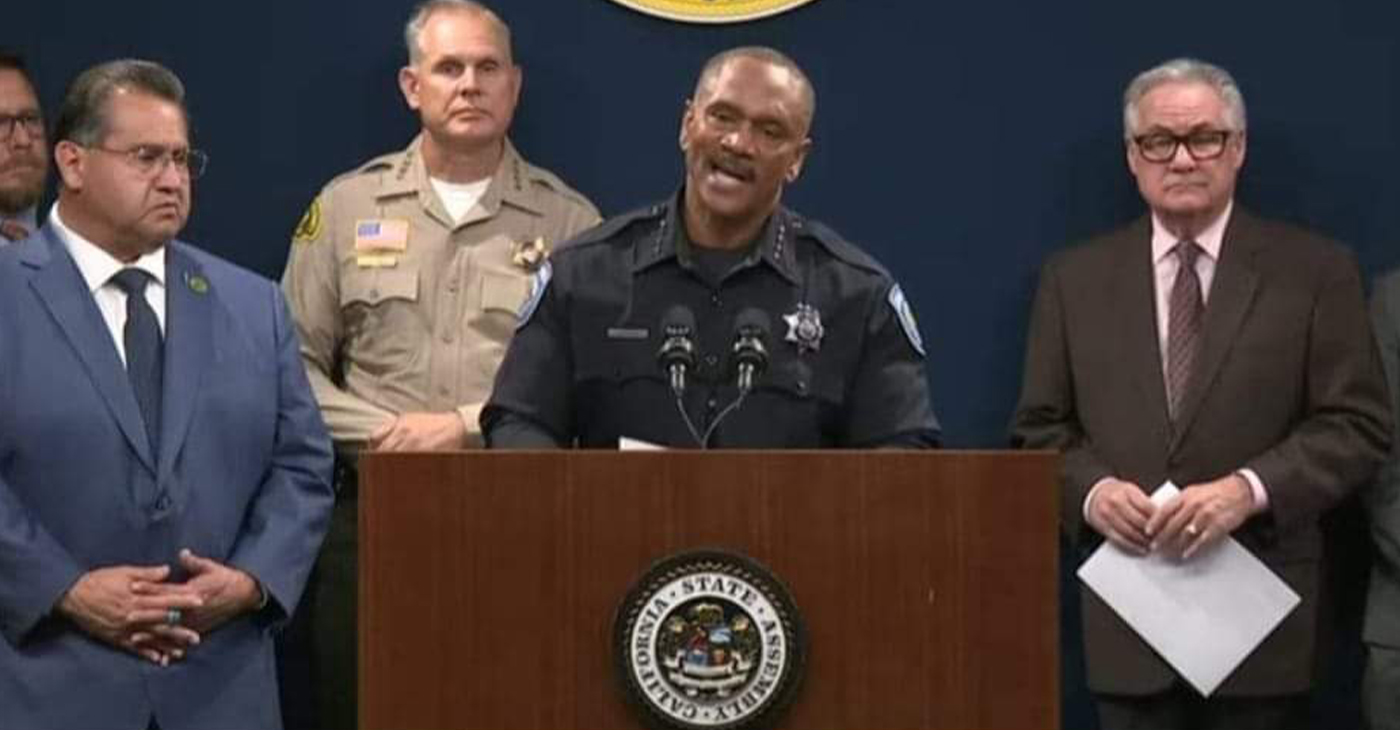Crime
Obama Bans Some Military-style Equipment Provided to Police
By Associated Press
In a surprise announcement coming nine months after police in riot gear dispelled racially charged protests, President Barack Obama is banning the federal government from providing some military-style equipment to local departments and putting stricter controls on other weapons and gear distributed to law enforcement.
The announcement comes after the White House suggested last year that Obama would maintain programs that provide the type of military-style equipment used to respond to demonstrators last summer in Ferguson, Missouri, because of their broader contribution to public safety. But an interagency group found “substantial risk of misusing or overusing” items like tracked armored vehicles, high-powered firearms and camouflage could undermine trust in police.
With scrutiny on police only increasing in the ensuing months after a series of highly publicized deaths of black suspects nationwide, Obama also is unveiling the final report of a task force he created to help build confidence between police and minority communities in particular. The announcements come as Obama is visiting Camden, New Jersey, one of the country’s most violent and poorest cities.
Obama plans to visit Camden police headquarters before heading to a community center to meet with youth and law enforcement and give a speech. “I’ll highlight steps all cities can take to maintain trust between the brave law enforcement officers who put their lives on the line, and the communities they’re sworn to serve and protect,” Obama said in his weekly address out Saturday.
In previewing the president’s trip, the White House said that effective immediately, the federal government will no longer fund or provide armored vehicles that run on a tracked system instead of wheels, weaponized aircraft or vehicles, firearms or ammunition of .50-caliber or higher, grenade launchers, bayonets or camouflage uniforms. The federal government also is exploring ways to recall prohibited equipment already distributed.
In addition, a longer list of equipment the federal government provides will come under tighter control, including wheeled armored vehicles like Humvees, manned aircraft, drones, specialized firearms, explosives, battering rams and riot batons, helmets and shields. Starting in October, police will have to get approval from their city council, mayor or some other local governing body to obtain it, provide a persuasive explanation of why it is needed and have more training and data collection on the use of the equipment.
The issue of police militarization rose to prominence last year after a white police officer in Ferguson fatally shot unarmed black 18-year-old Michael Brown, sparking protests.
Critics questioned why police in full body armor with armored trucks responded to dispel demonstrators, and Obama seemed to sympathize when ordering a review of the programs that provide the equipment.
“There is a big difference between our military and our local law enforcement and we don’t want those lines blurred,” Obama last in August.
But he did not announce a ban in December with the publication of the review, which showed five federal agencies spent $18 billion on programs that provided equipment including 92,442 small arms, 44,275 night-vision devices, 5,235 Humvees, 617 mine-resistant vehicles and 616 aircraft.
At the time, the White House defended the programs as proving to be useful in many cases, such as the response to the Boston Marathon bombing. Instead of repealing the programs, Obama issued an executive order that required federal agencies that run the programs to consult with law enforcement and civil rights and civil liberties organizations to recommend changes that make sure they are accountable and transparent.
That working group said in a report out Monday that it developed the list of newly banned equipment because “the substantial risk of misusing or overusing these items, which are seen as militaristic in nature, could significantly undermine community trust and may encourage tactics and behaviors that are inconsistent with the premise of civilian law enforcement.”
The separate report from the 21st Century Policing task force has a long list of recommendations to improve trust in police, including encouraging more transparency about interactions with the public. The White House said 21 police agencies nationwide, including Camden and nearby Philadelphia, have agreed to start putting out never-before released data on citizen interactions like use of force, stops, citations and officer-involved shootings.
The administration also is launching an online toolkit to encourage the use of body cameras to record police interactions. And the Justice Department is giving $163 million in grants to incentivize police departments to adopt the report’s recommendations.
Activism
Oakland Post: Week of April 24 – 30, 2024
The printed Weekly Edition of the Oakland Post: Week of April 24 – 30, 2024

To enlarge your view of this issue, use the slider, magnifying glass icon or full page icon in the lower right corner of the browser window. ![]()
Alameda County
DA Pamela Price Stands by Mom Who Lost Son to Gun Violence in Oakland
Last week, The Post published a photo showing Alameda County District Attorney Pamela Price with Carol Jones, whose son, Patrick DeMarco Scott, was gunned down by an unknown assailant in 2018.

Publisher’s note: Last week, The Post published a photo showing Alameda County District Attorney Pamela Price with Carol Jones, whose son, Patrick DeMarco Scott, was gunned down by an unknown assailant in 2018. The photo was too small for readers to see where the women were and what they were doing. Here we show Price and Jones as they complete a walk in memory of Scott. For more information and to contribute, please contact Carol Jones at 510-978-5517 at morefoundation.help@gmail.com. Courtesy photo.
California Black Media
Anti-Theft Bill with Jail-Time Requirement Gets Wide Ranging Support
Fed up with the alarming frequency of retail theft across California, including smash and grabs, a diverse group of business leaders, law enforcement officials, policymakers and public safety advocates joined their efforts in Sacramento on Jan. 24. Their purpose: to increase public support for Assembly Bill (AB) 1772, a bill that would make jail time mandatory for repeat theft offenders.

By California Black Media
Fed up with the alarming frequency of retail theft across California, including smash and grabs, a diverse group of business leaders, law enforcement officials, policymakers and public safety advocates joined their efforts in Sacramento on Jan. 24.
Their purpose: to increase public support for Assembly Bill (AB) 1772, a bill that would make jail time mandatory for repeat theft offenders.
Co-authored by Assemblymembers James C. Ramos (D-San Bernardino), Avelino Valencia (D-Anaheim) and Devon Mathis (R-Tulare), AB 1772 would require jail time “of one to three years for theft crimes depending upon the circumstances.
“Offenses would include grand theft, theft from an elder or dependent adult, theft or unauthorized use of a vehicle, burglary, carjacking, robbery, receiving stolen property, shoplifting or mail theft,” the bill language reads.
Ramos said the need to act is urgent.
“It’s time for us to reverse the spikes in theft crimes since the pandemic. Our law enforcement members and district attorneys need additional tools such as AB 1772. We must reverse the trend before the problem grows worse. Last year I requested a state audit of the impact of Prop 47 on Riverside and San Bernardino counties,” said Ramos.
Prop 47 is the California initiative, approved by voters in 2014, that reclassified some felonies to misdemeanors and raised the minimum amount for most misdemeanor thefts from $400 to $950.
According to a Public Policy Institute of California (PPIC) report, the rate of occurrence of petty crimes like shoplifting and commercial burglaries have increased by double digits over the last four years.
In Orange County alone, commercial burglaries have spiked by 54%.
“Our communities are experiencing an increase in retail crime and deserve appropriate action from their legislators,” Valencia said.
San Bernardino County Sheriff Shannon Dicus thanked Ramos.
“This bill, designed to impose stricter penalties on serial retail theft suspects, responds urgently to the escalating consequences of shoplifting and related crimes on our communities,” he said.
AB 1772 supporters who spoke at the gathering included Sacramento Sheriff Jim Cooper and San Bernardino Chief of Police Darren Goodman. Listed as supporters are the California State Sheriff’s Association, City of Riverside Police Chief Larry Gonzalez and Redlands Chamber of Commerce.
-

 Activism4 weeks ago
Activism4 weeks agoOakland Post: Week of March 27 – April 2, 2024
-

 #NNPA BlackPress4 weeks ago
#NNPA BlackPress4 weeks agoBeloved Actor and Activist Louis Cameron Gossett Jr. Dies at 87
-

 Community1 week ago
Community1 week agoFinancial Assistance Bill for Descendants of Enslaved Persons to Help Them Purchase, Own, or Maintain a Home
-

 Activism3 weeks ago
Activism3 weeks agoOakland Post: Week of April 3 – 6, 2024
-

 Business1 week ago
Business1 week agoV.P. Kamala Harris: Americans With Criminal Records Will Soon Be Eligible for SBA Loans
-

 Activism2 weeks ago
Activism2 weeks agoOakland Post: Week of April 10 – 16, 2024
-

 Community1 week ago
Community1 week agoAG Bonta Says Oakland School Leaders Should Comply with State Laws to Avoid ‘Disparate Harm’ When Closing or Merging Schools
-

 Community6 days ago
Community6 days agoOakland WNBA Player to be Inducted Into Hall of Fame





















































